
04 March 23
Live on the homepage now!
Reader Supported News
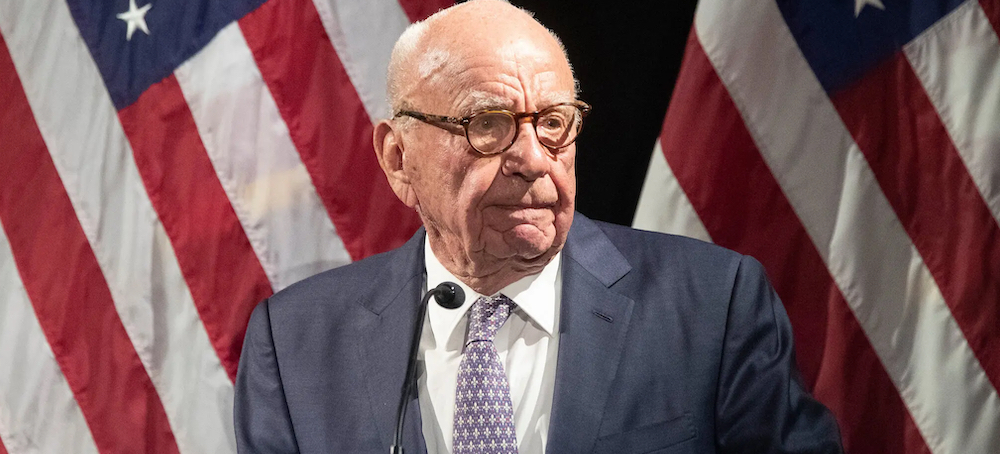
Greg Sargent | Finally, Democrats Appear Ready to Wage War on Fox News
Greg Sargent, The Washington Post
Sargent writes: "For years, Democrats have been deeply conflicted about Fox News. At times, they've shunned the network as an irredeemable source of disinformation, boycotting it or banning it from covering Democratic presidential primary debates."
ALSO SEE: Rupert Murdoch's Press Empire Is a Threat to Democracy
For years, Democrats have been deeply conflicted about Fox News. At times, they’ve shunned the network as an irredeemable source of disinformation, boycotting it or banning it from covering Democratic presidential primary debates. But such efforts have been temporary: They have tended to resume appearing on the network and have reverted to treating it as more or less a news channel, albeit a hostile one.
Now, however, it’s becoming clear that interacting with Fox News as a news outlet in any sense is no longer an option for Democrats. In light of the news that network personalities knowingly deceived viewers about the 2020 election for cynical pecuniary purposes, Democrats plainly have to take on Fox News in a new way. And some of them know it.
“I don’t think we’ve ever had a moment like this, where a major news network has been exposed as deliberately deluding its viewers or readers,” Sen. Chris Murphy (D-Conn.) told me. “This is a seminal moment in the history of mass media. And we need to treat it that way.”
But what should that look like?
This week, Senate Majority Leader Charles E. Schumer and House Minority Leader Hakeem Jeffries signaled an aggressive posture in a letter to Fox News founder Rupert Murdoch. The two New York Democrats demanded that the network get star anchor Tucker Carlson and others to recant their lies about the 2020 election on the air. The letter said:
Though you have acknowledged your regret in allowing this grave propaganda to take place, your network hosts continue to promote, spew, and perpetuate election conspiracy theories to this day.
This might be the first time that the Democratic congressional leadership has formally labeled Fox News content “propaganda.”
The term is entirely apt. As newly revealed texts from Carlson and other on-air personalities and executives demonstrate, they feared that telling their audience the truth about the 2020 vote could cost them a disastrously high number of viewers. Instead, Fox News personalities kept lying about it while executives looked the other way.
Carlson even rage-texted that a Fox News reporter who fact-checked President Donald Trump’s lies about Dominion Voting Systems and the ballot count should be fired for “measurably hurting” News Corp.’s “stock price.” The texts, which emerged in Dominion’s defamation lawsuit against Fox, also show that Carlson and host Sean Hannity agreed that the channel’s accurate call of Trump’s loss in Arizona threatened its “brand.”
Murdoch himself admitted in a deposition that Fox News had failed to do enough to prevent its personalities from pushing lies about the election. In short, the network deliberately sought to keep its viewers captive in its propaganda bubble to keep ratings up — and revenue flowing.
Given these revelations, doesn’t that oblige Democrats to adopt an approach commensurate with the reality that Fox News is systematically and concertedly deceiving millions of people about the most fundamental workings of our governing institutions?
This might start with forcefully conveying to the public what’s been revealed about Fox News’s post-election conduct.
“We need to be in the business of communicating the gravity of what happened,” Murphy told me. He noted that Democrats must be “very clear about how manipulative Fox executives and hosts are,” and that they rely on “deliberate lying as a means to get ratings, and to keep viewers hooked in.”
Should Democrats again refrain from appearing on Fox News? They have long been conflicted about this, with some arguing that Democrats shouldn’t forgo the opportunity to reach right-leaning voters wherever possible. But in light of the new revelations, there might be a better way to think about it.
Dan Pfeiffer, who was senior communications adviser to President Barack Obama, says Democrats should remember that their appearances on Fox News will never reach many conservative voters in unadulterated form. A Democrat’s quotes will inevitably be diced into incriminating bites and fed to a larger conservative audience via high-rated opinion shows and right-wing social media.
However, Pfeiffer says, because a Democrat’s appearance on Fox News will intrinsically generate media interest, party members should appear if they want to — but with eyes wide open, expressly to create viral moments that will reach the Democratic base and independent voters.
“Go on looking for a fight,” Pfeiffer advises. “The press will cover what you say on Fox.” As a result, he says, this will facilitate “reaching people outside of the Fox audience.” Similarly, strategist Simon Rosenberg is urging fellow Democrats to confront Fox News’s mythmaking by “getting loud” themselves, to displace right-wing agitprop with Democrats’ own media-conscious messaging and theater.
Such ideas seem more in tune with the realities of today’s media ecosystem than other tactics Democrats have toyed with. For instance, it has been suggested that Democrats consider steps such as trying to get Fox News expelled from the White House press corps.
Ultimately, that seems trivial and small. Democrats should proceed from an enlarged understanding of the network’s role as a kind of Death Star in the broader universe of right-wing and GOP information warfare. As Brian Beutler notes, when House GOP leaders granted Carlson exclusive access to Capitol riot surveillance footage, this constituted a clear declaration that the party fully endorses Fox News’s efforts to swamp our politics with propaganda, and sees the outlet’s interests as synonymous with its own.
The real lesson from the revelations is that this Fox-GOP synchronization will remain fundamental to Republican and right-wing politics for the foreseeable future. Like it or not, Democrats are in an information war. As they work through their response, specific tactics seem less important than internalizing this baseline realization and allowing it to shape everything they do.
READ MORE
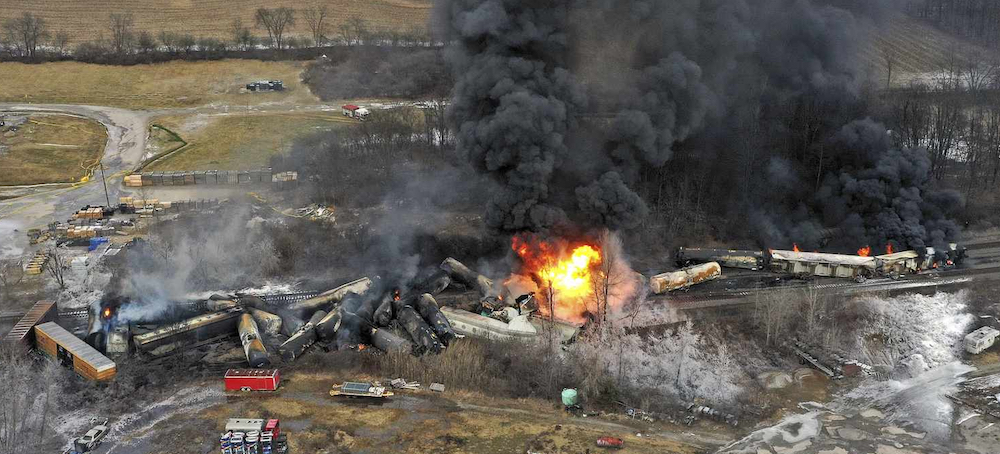 On Feb. 3, the train pulling 150 cars through the village left the rails and toppled over. (photo: Gene J. Puskar/AP/Shutterstock)
On Feb. 3, the train pulling 150 cars through the village left the rails and toppled over. (photo: Gene J. Puskar/AP/Shutterstock)
Leaked Audio Reveals Workers Were Told to Skip Inspections as Ohio Crash Incites Scrutiny to Industry
Michael Sainato, Guardian UK
Sainato writes: "In leaked audio heard by the Guardian, a manager for one of the US's largest rail companies can be heard explaining to a former carman that they should stop tagging railcars for broken bearings. The manager says doing so delays other cargo."
Exclusive: employee says manager told her to stop marking cars for repair, as Ohio derailment brings hard look at industry’s record of blocking safety rules
In leaked audio heard by the Guardian, a manager for one of the US’s largest rail companies can be heard explaining to a former carman that they should stop tagging railcars for broken bearings. The manager says doing so delays other cargo.
The disclosure comes as federal agencies investigate the derailment in East Palestine, Ohio. A wheel-bearing failure was cited as the cause of the crash in a preliminary report released by the National Transportation Safety Board.
In late 2016, Stephanie Griffin, a former Union Pacific carman, went to her manager with concerns that she was getting pushback for tagging – or reporting for repair – railcars. Her manager told her it was OK to skip inspections.
Griffin asked if the manager could put that in writing. “That’s weird,” said the manager. “We have 56 other people who are not bad-ordering stuff out there. You’re definitely not going to get in trouble for it.”
Griffin said: “He refused to bad-order [mark for repair] cars for bad wheel bearings. My boss took issue with it because it increased our dwell time. When that happened, corporate offices would start berating management to release the cars.”
Dwell time refers to the time a train spends at a scheduled stop without moving. “It’s very obvious that management is not concerned with public safety, and only concerned with making their numbers look good,” Griffin said.
Griffin also claimed she and other workers did not receive any formal training to inspect and repair railcars, and were left to learn from an older worker and figure the rest out from American Association of Railroads and Federal Railroad Administration handbooks. Griffin suggested all major railroad carriers operate similarly.
As part of her job at the railyard, Griffin was to inspect all railcars on inbound journeys for defects and put a tag on them to send the cars to the railroad yard repair shop. On outbound journeys, workers were supposed to check the cars’ air brakes and make a final inspection. But, she said, management, at the behest of corporate, undermined workers’ effectiveness on the job.
She said: “The regulation at the time stated that a wheel bearing was bad when it had ‘visible seepage’. But that was very vague, and the bosses used that vagueness to their advantage. For me, it was whenever oil was visible on the bearing. For my bosses, they wanted actual droplets and proof it would leak on the ground.
“Most railroad workers are fighting against an entire system that only exists as a money-making apparatus to the wealthy. Those trains run through our towns, but they do not run next to rich folks’ homes, nor next to our politicians’ homes. This is a top-down problem.”
A spokesperson for Union Pacific said in an email: “Nothing is more important than the safety of Union Pacific employees and the communities we serve. Union Pacific does not have the alleged recording and cannot comment on its authenticity.”
It added: “Employees are expected and encouraged to report concerns, and have a number of avenues to do so, including a 24/7 anonymous hotline and they are firmly protected from retaliation.”
The East Palestine derailment has prompted a wave of scrutiny into the railroad industry’s record of deregulation and blocking safety rules.
Train-brake rules were rolled back under the Trump administration and have not been restored; hazardous material regulations were watered down at the behest of the railroad industry; and railroad workers have been decrying the safety impacts incited by years of staffing cuts, poor working conditions and neglect by railroad corporations in favor of Wall Street investors.
The rate of train derailments has increased over the past decade, with two derailments per every 1m miles traveled on the railroads, compared to 1.71 derailments in 2013. There were 818 derailments reported in 2022, with 447 train cars carrying hazardous materials either damaged or derailed.
“The railroads have opposed any government regulation on train length; they have sought waivers to eliminate having trained inspectors monitor railcars; and they have pushed back on the train crew staffing rule.” said Brotherhood of Locomotive Engineers and Trainmen (Blet) national president Eddie Hall in a statement after the NTSB preliminary report on the East Palestine derailment.
“The railroads and their trade association the Association of American Railroads (AAR) employ armies of lobbyists on Capitol Hill who are there not to promote safety regulations but to slow the implementation of federal safety regulations – or attempt to eliminate them altogether.”
Edward Wytkind, who served as president of the Transportation Trades Department (TTD) at the AFL-CIO, which represents the unions in the railroad industry, said that throughout his 25 years at the TTD, the railroad industry blocked all attempts to pass legislation or advance regulation on safety.
“From attempts to address worker fatigue, lack of coherent mandatory safety plans, increasing transparency to the public and first responders about what trains are carrying, the dangers of such long trains, or establishing floors for minimum train crew, the railroads blocked everything,” said Wytkind.
“It took a horrific derailment in Ohio that is now raising major public health alarms to get the public to understand this is a very important industry. Obviously our economy depends on it, but it’s also a dangerous industry that needs to be regulated.”
A signal maintainer on the railroads who requested to remain anonymous for fear of retaliation said that in recent years staff has been cut and the region signal maintainers are forced to cover has been extended as a result of “precision scheduled railroading”, a cost-cutting system that has resulted in class 1 railroads cutting their workforce by 30% since 2016.
“We’ve lost a signal maintainer, relief maintainer, and they’ve extended from 80 miles to over 100 miles of tracks,” they said. “We’re overworked. They keep adding more tasks for us to do and cover and it’s getting to where all we’re doing is just testing and not doing much maintenance any more.”
They said they have worked hundreds of hours of overtime so far this year because of short staffing and the high workloads, and this has created safety concerns, because there is no time to keep up with the workloads or properly train newer employees.
“There’s a big opportunity to miss and overlook things. There is a big opportunity for something to fail. Missed switches, something with crossings being overlooked … could cause train derailments. Or people could get hit at railroad crossings,” the employee added.
“There could be many opportunities for catastrophic failure between train departments that are shorthanded, maintenance workers that are shorthanded and overworked, the signal department that’s overworked and understaffed.
“It’s just an opportunity for a big failure to happen. We don’t have as many eyes or as many hands on like we used to.”
Jeff Kurtz, a retired locomotive engineer of 40 years in Iowa, said the railroad industry talking points on safety in response to the East Palestine derailment have been misleading, as the industry has trended toward adding several more railcars to trains, making them much longer, which can make derailments more damaging when they do occur. This trend has been pursued to further cut costs and increase efficiency, despite safety concerns.
“What most people aren’t talking about that would have either mitigated a lot of the damage, and it may have prevented the derailment, is reducing the size of these trains,” said Kurtz. “Because the in-train forces are increased exponentially when a train’s length and weight is increased, the chance of derailments and the increase in damage is exponentially increased.”
The size of the train that derailed in East Palestine, Ohio was 150 cars, more than twice the average length of trains operated by major railroads from 2008 to 2017. There is currently no limit imposed by the Federal Railroad Administration on train length. The industry has dismissed safety concerns on the issue.
“A derailment with a 5,000-ton train with [a small amount of] hazardous material is a whole different animal than a derailment of an 18,000-ton train loaded with hazardous material. Plus, a long, heavy train is easier to derail,” Kurtz added.
“Secretary [Pete] Buttigieg said that there are about 1,000 derailments a year. If we let the carriers run these monster trains loaded with hazardous material, cut the number of derailments to 300 a year, but blow up a town or city every other year: is that acceptable?”
READ MORE
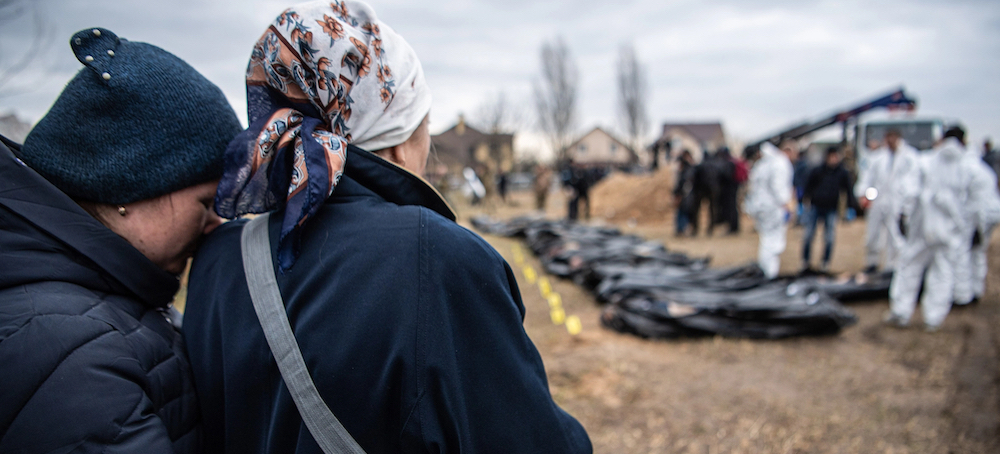 Women watch and embrace each other as bodies are exhumed from a mass grave and inspected by the authorities for possible war crimes in Bucha. (photo: Laurel Chor/SOPA Images/Sipa USA)
Women watch and embrace each other as bodies are exhumed from a mass grave and inspected by the authorities for possible war crimes in Bucha. (photo: Laurel Chor/SOPA Images/Sipa USA)
Garland Says the US Is Pushing War Crimes Probes in Ukraine and Has Several Suspects
Carrie Johnson, NPR
Johnson writes: "Attorney General Merrick Garland pledged to 'stand shoulder to shoulder' with war crimes prosecutors in Ukraine and said U.S. investigators had already 'zeroed in' on what they say are specific crimes allegedly committed by Russian forces in an unannounced visit to a country at war."
Attorney General Merrick Garland pledged to "stand shoulder to shoulder" with war crimes prosecutors in Ukraine and said U.S. investigators had already "zeroed in" on what they say are specific crimes allegedly committed by Russian forces in an unannounced visit to a country at war.
Garland met with Ukranian President Vloydomyr Zelinsky and signed an agreement to promote information sharing about Russian atrocities that have targeted maternity hospitals, schools, and other civilian dwellings since the start of the unprovoked conflict one year ago.
"The perpetrators of those crimes will not get away with it," Garland said in remarks to a room filled with European justice ministers, presidents and other dignitaries.
The attorney general said the United States has a long memory when it comes to war crimes, pointing to a years-long effort to identify and deport Nazi war criminals who fled to America. Ultimately about 130 such cases advanced, many a generation or more after World War II ended.
Garland pointed out the Justice Department already has legal authority to prosecute people who kill U.S. citizens overseas and said DOJ has already identified several suspects. "Our prosecutors are working day and night to bring them to justice as quickly as possible," he said.
Congress recently granted DOJ the power to bring to justice other war criminals from other parts of the world so long as they're living or staying inside America's borders.
"War criminals will find no refuge in the United States," he added.
He detailed areas of close cooperation already under way with Ukraine and allies to keep track of complex streams of evidence, provide forensic help and training, and to even advise on environmental crimes that have victimized Ukrainians during the course of the ongoing conflict. Soon, Garland said, he would post a legal adviser from the U.S. to work in the country.
The meeting comes as investigators inside Ukraine are sifting through the rubble of disaster sites and exhumed graves to document evidence of mistreatment and abuse. And it also comes as the war rages on. Garland and other American officials said part of the motivation for speaking now is to deliver a message that could reach Russians waging the conflict.
The attorney general said the U.S. would support separate international efforts targeting people responsible for the crime of aggression, pointing out that effort was led by his predecessor, Robert Jackson.
He ended his remarks by pointing to a bit of personal history. His grandmother made it into the U.S. before Nazis invaded their homeland. But two of her siblings never made it out of Europe, perishing in the Holocaust. Survivors are still in the dark about what happened to them, and when.
The families of the current conflict in Ukraine "deserve to know what happened to their loved ones," Garland said. "They deserve justice."
READ MORE
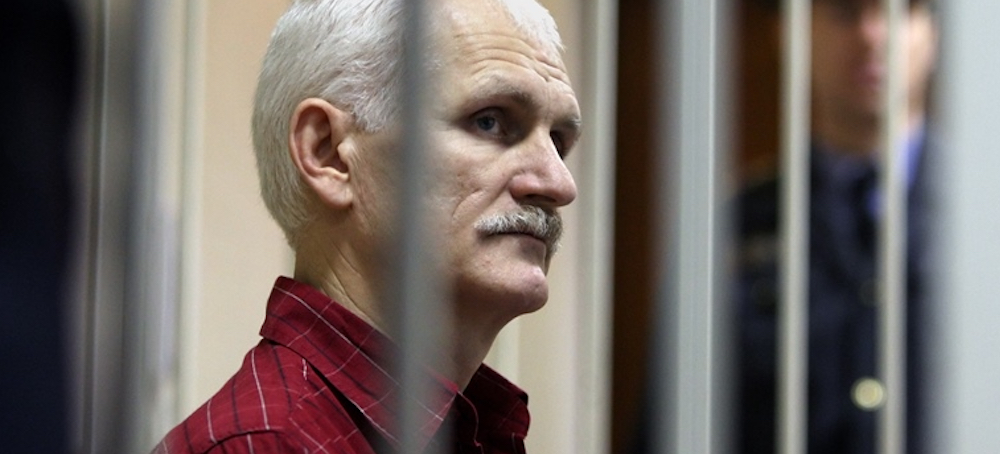 Ales Bialiatski. (photo: NHC)
Ales Bialiatski. (photo: NHC)
Nobel Peace Laureate Ales Bialiatski Sentenced to 10 Years in Belarus
Yuras Karmanau, Associated Press
Karmanau writes: "A court on Friday sentenced Belarus' top human rights advocate and one of the winners of the 2022 Nobel Peace Prize to 10 years in prison, the latest move in a yearslong crackdown on dissent that has engulfed the ex-Soviet nation since 2020."
ALSO SEE: Who Is Belarusian Nobel Laureate Ales Bialiatski?
Authorities arrested Bialiatski and two of his associates after massive protests over a 2020 election that gave authoritarian President Alexander Lukashenko a new term in office.
Acourt on Friday sentenced Belarus’ top human rights advocate and one of the winners of the 2022 Nobel Peace Prize to 10 years in prison, the latest move in a yearslong crackdown on dissent that has engulfed the ex-Soviet nation since 2020.
The harsh punishment of Ales Bialiatski and three of his colleagues was delivered in response to massive protests over a 2020 election that gave authoritarian President Alexander Lukashenko a new term in office.
Lukashenko, a longtime ally of Russian President Vladimir Putin who backed Putin’s invasion of Ukraine, has ruled the ex-Soviet country with an iron fist since 1994. More than 35,000 people were arrested, and thousands were beaten by police amid the protests, the largest ever held in the country.
Belarus is an outlier in its support of the year-old Russian invasion, with other countries in the region not backing Moscow publicly.
Bialiatski and his colleagues at the human rights center he founded were convicted of financing actions violating public order and smuggling, the center reported Friday.
Valiantsin Stefanovich was given a nine-year sentence; Uladzimir Labkovicz seven years; and Dzmitry Salauyou was sentenced in absentia to eight years in prison.
During the trial, which took place behind closed doors, the 60-year-old Bialiatski and his colleagues were held in a caged enclosure in the courtroom. They have spent a year and nine months behind bars since their arrest.
In the photos from the courtroom released Friday by Belarus’ state news agency Belta, Bialiatksi, clad in black clothes, looked wan, but calm.
All four activists have maintained their innocence, the Human Rights Center Viasna said after the verdict. Viasna is Belarusian for “spring.”
In his final address to the court, Bialiatski urged the authorities to “stop the civil war in Belarus.” He said it became obvious to him from the case files that “the investigators were fulfilling the task they were given: to deprive Viasna human rights advocates of freedom at any cost, destroy Viasna and stop our work.”
Exiled Belarusian opposition leader Sviatlana Tsikhanouskaya called the verdict “appalling.”
“We must do everything to fight against this shameful injustice (and) free them,” Tsikhanouskaya tweeted Friday.
Memorial, the prominent Russian human rights group that shared the 2022 Nobel Peace Prize with Bialiatski and the Ukrainian Center for Civil Liberties, in an online statement denounced the verdict as “an undisguised lawless reprisal for their human rights activities as part of a campaign of terror against civil society and the entire people of Belarus.”
Oleg Orlov, co-chair of Memorial, attempted to fly to Minsk to support Bialiatski on Friday, but was prevented from boarding the flight, with airline representatives telling him Belarus had barred him from entering the country. “Crimes are better committed without witnesses,” Orlov remarked.
Volodymyr Yavorsky from the Center for Civil Liberties told The Associated Press that Ukrainian human rights advocates express solidarity with Bialiatski and demand his release.
“This verdict shows that the highest level of repression in Europe is in Belarus,” Yavorsky said. “Ukraine is currently resisting the very totalitarian model that the Kremlin tries to impose on the entire former Soviet space.”
The punishment also elicited outrage in the West.
The Norwegian Helsinki Committee, a nongovernmental human rights organization, said that it was “shocked by the cynicism behind the sentences.”
German Foreign Minister Annalena Baerbock labeled the trial and sentencing “a farce.”
“This is just as much a daily disgrace as Lukashenko’s support for Putin’s war,” Baerbock tweeted Friday. “We call for the end of political persecution and freedom for the more than 1,400 political prisoners.”
Condemnations of the verdict also came from the Council of Europe rights watchdog and the U.N. Human Rights spokesperson.
Bialiatski is the fourth person in the 121-year history of the Nobel Prizes to receive the award while in prison or detention.
READ MORE
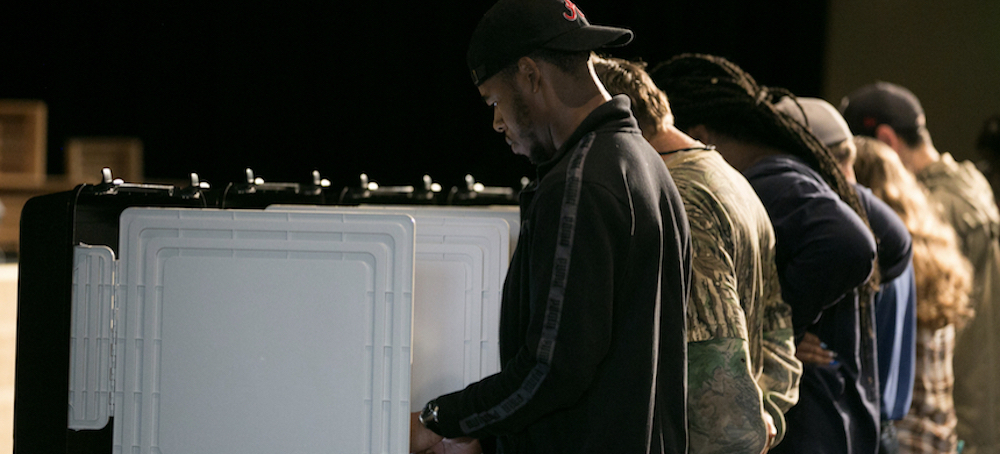 Voters at a polling precinct. (photo: Jessica McGowan)
Voters at a polling precinct. (photo: Jessica McGowan)
Georgia Republicans Want to Make It Easier to Challenge Voters' Eligibility
Jane C. Timm, NBC News
Timm writes: "Georgia Republicans introduced legislation Tuesday to make it easier to kick voters off the rolls through mass challenges, according to a copy of the bill sent to lawmakers and shared with NBC News by an aide to two of the bill's sponsors."
Hours after NBC News revealed that at least 92,000 voter registrations were challenged last year, Georgia Republicans proposed changes to make challenges even easier.
Georgia Republicans introduced legislation Tuesday to make it easier to kick voters off the rolls through mass challenges, according to a copy of the bill sent to lawmakers and shared with NBC News by an aide to two of the bill's sponsors.
Changes to the challenge rules were proposed to Senate Bill 221 on Tuesday night, part of a committee substitute replacing a previous version of the bill.
A draft of proposed legislation was released hours after NBC News exclusively revealed that at least 92,000 voter registrations were challenged in Georgia last year. Amateur fraud hunters largely used voter rolls, public records (including change-of-address data from the U.S. Postal Service) and some door-to-door canvassing in their claims that voters were ineligible.
Most of the challenges were rejected, and some counties said broadly that having mail forwarded was not enough evidence to conclude a voter had moved. Some people spend time at other addresses without abandoning residency in the state, advocates and election administrators said.
The new SB 221 would change that, noting that appearing on the postal service's change-of-address database “shall constitute sufficient cause to sustain the challenge against the elector” unless a voter is determined meet certain exceptions, like being a student.
It’s unclear whether sustaining a challenge would result in the voter’s registration getting canceled or require further action from county or election administrators, but voting rights advocates cautioned against the bill at a briefing Tuesday.
“If being on the [National Change of Address System] meant it was enough to take you off the voter rolls, that would be disastrous and I hope immediately thrown out of court,” said Vasu Abhiraman, an attorney with the American Civil Liberties Union of Georgia, arguing that federal voting rights law would prohibit such a rule.
Challenges made within 45 days of elections would be delayed, according to the legislation.
Jason Frazier, a Fulton County resident who filed thousands of 2022 voter challenges, spoke in defense of the bill at a committee hearing Tuesday.
"For the most part, I love the bill. I think it will help out quite a bit with the voter challenges," he said. "I'm not trying to disenfranchise anybody, but we need to do this the right way."
The bill would also increase the security at and surveillance of drop boxes in Georgia, requiring election officials to have video cameras and enough lighting to show voters' faces when they deposit their ballots.
The recordings, the bill says, must available online.
“It encourages vigilante intimidation and disenfranchisement,” said Esosa Osa, the deputy executive director of the voting rights group Fair Fight Action.
READ MORE
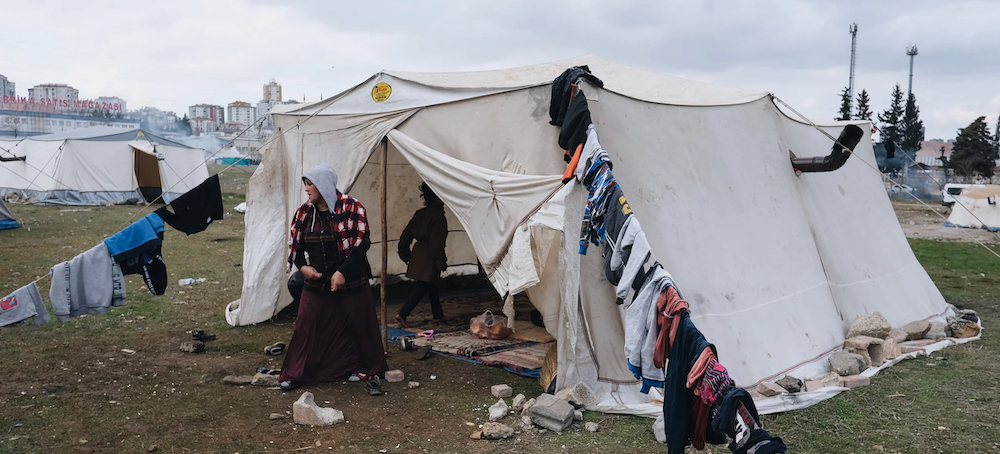 A 26-year-old pregnant woman named Talibe Gezginci cleans her tent in a makeshift camp for displaced people in Gaziantep. (photo: Erin O'Brien/NPR)
A 26-year-old pregnant woman named Talibe Gezginci cleans her tent in a makeshift camp for displaced people in Gaziantep. (photo: Erin O'Brien/NPR)
We Shouldn't Need an Earthquake to Know Sanctions Don't Work
Phyllis Bennis, In These Times
Bennis writes: "In the face of the 7.8-magnitude earthquake that devastated parts of Turkey and Syria on February 6 - claiming the lives of more than 50,000 people - the Biden administration took a symbolically important but thoroughly insufficient step toward doing the right thing: It temporarily eased certain economic sanctions to allow humanitarian support into a ravaged Syria."
Sanctions are an instrument of war, not an alternative to it.
In the face of the 7.8-magnitude earthquake that devastated parts of Turkey and Syria on February 6 — claiming the lives of more than 50,000 people — the Biden administration took a symbolically important but thoroughly insufficient step toward doing the right thing: It temporarily eased certain economic sanctions to allow humanitarian support into a ravaged Syria.
After years of crippling sanctions and efforts to isolate Syria from the rest of the world, Washington’s decision February 9 reflected at least some level of recognition of the quake’s devastation. It also represented a significant victory for activists, including the American-Arab Anti-Discrimination Committee and others, who moved swiftly into action to make clear that, if the United States actually wanted to help the Syrian people, lifting sanctions had to be a central part of any relief package.
Perhaps most importantly, the policy change is at least a partial de facto acknowledgement from the White House of the harm that broad economic sanctions inflict. Washington has imposed sanctions on Syria since 1979, and most of the ostensible targets have been government agencies and officials. But ordinary people have felt the impact far more than any elites, as is true under any authoritarian government.
In 2004, President George W. Bush escalated sanctions against Syria in the context of the so-called Global War on Terror. In 2011, as Syria’s Arab Spring uprising was met with severe government repression and Washington joined the widening, emerging proxy wars, the United States froze Syrian government assets, prohibited investment and cut off any purchase involving Syria’s oil industry.
In 2020, the Trump administration dramatically expanded sanctions again. The new law stated the U.S. policy is that “diplomatic and coercive economic means should be utilized to compel the government of Bashar al-Assad to halt its murderous attacks on the Syrian people and to support a transition to a government in Syria that respects the rule of law, human rights, and peaceful co-existence with its neighbors.” Among other things, the new sanctions prohibited any “contracts related to reconstruction in areas of Syria controlled by the Syrian government and its allies.” Needless to say, none of the sanctions stopped the Syrian government’s repression and human rights violations.
As the Syrian economy continued its slide into full-blown crisis, prohibitions on U.S. financial transactions with Syria prevented most Syrians from traveling to the United States and made it almost impossible for Syrians abroad to provide any assistance to their families.
After the earthquake, the February 9 decision provides a general license to allow earthquake-related humanitarian aid to Syria — but it will only help a fraction of the problems caused by the sanctions, not to mention the other crises facing Syrians. Indeed, the Treasury Department order does not actually lift the sanctions (many of which the United Nations and other humanitarian agencies agree continue to have “long-term negative effects”). Instead, the order authorizes “all transactions related to earthquake relief efforts in Syria that would otherwise be prohibited by the Syrian Sanctions Regulations,” which means all of the sanctions actually remain in place, just with relief-related exceptions. The problem remains that many manufacturers and especially banks will remain reluctant to risk doing any business with Syria, in fear that their tents or computers will be deemed unrelated to relief or the general license could be revoked, leaving them in violation of the sanctions.
A group of 10 UN special rapporteurs on human rights noted an effective emergency earthquake response and recovery must go beyond what the United States has done and should actually include “the lifting of all economic and financial restrictions caused by unilateral sanctions against Syria during this time of sorrow and human suffering.” Their report goes on, “even during natural disasters, when hundreds of thousands of lives are at stake, it is gravely concerning that humanitarian actors face persisting challenges due to sanctions,” and notes, “systems of humanitarian carve-outs may not be sufficient to address the long-term negative effects of sanctions.”
The same problem exists with U.S. sanctions imposed against Iran, Cuba, Afghanistan, Venezuela and a host of other countries. An official statement granting a general license to send humanitarian supplies is simply not enough to solve the problems that U.S. sanctions created in the first place. Those problems can lead to millions of people — children, elders and many more — facing hunger, cold, lack of shelter, lack of medical care. Many have died and many more will die.
In the case of Syria, U.S. sanctions are an important component — but not the only one — of Washington’s role in the country’s already dire pre-earthquake crisis. Direct U.S. involvement in Syria’s wars has played a part in the massive death and destruction of the Syrian people and their communities, which has included arms, training and other military support for opposition forces — some of which ended up assisting the al Qaeda-linked militias in northwest Syria, as well as massive killings of civilians and destruction of cities in U.S. battles against ISIS.
Washington is, of course, not the only bad actor. Millions of Syrians have lived, been dispossessed and died through more than a decade of brutal battles fought in and around their country. A civil war pitted a repressive regime against a popular, initially nonviolent protest movement that eventually took up arms against the authoritarian government in Damascus. A set of parallel wars involved internal, regional and global actors — the United States and Russia, Iran and Israel, Turkey and Saudi Arabia, ISIS, al Qaeda and more — all fighting to the last Syrian. Cities like Raqqa and Aleppo have been attacked by ISIS and leveled by U.S., Russian and Syrian government airstrikes and drone attacks.
Displaced Syrians, and Palestinian, Iraqi and other refugees who sought safety in Syria, all continue to face displacement, struggle to feed their children in the face of a food shortage worsened by the war in Ukraine, and now face the aftermath of an unfathomably powerful earthquake.
The responsibility of the international community — including governments and civil society — to respond to these desperate needs, is enormous. That means providing direct support and solidarity, pushing all of our governments to immediately provide more funds and trained people and equipment, demanding that all crossing points into all parts of Syria be opened and used regardless of which forces are in control — and demanding an end to the sanctions that are making the work of providing support much harder.
Talking about sanctions is particularly relevant right now because we have been immersed in almost a full year of U.S.- and European-led cheerleading for sanctions against Russia. That cheerleading has led many to claim that sanctions are useful, that they play a key role in changing the behavior of human rights-violating governments, and that they are targeted so carefully that ordinary people are not harmed.
None of those things are true.
The sanctions imposed on Russia — including those targeting the oil industry and its vast revenues — didn’t prevent and haven’t reversed Russia’s illegal military assault and occupation of Ukrainian territory. They haven’t even slowed that attack. There’s little evidence the sanctions’ overall impact on the Russian economy is significant; a recent New York Times print edition headline even reads, “Sanctions Haven’t Stopped Flow of Oil Cash to Russia.” But it looks like sanctions are increasing the pain on ordinary people, especially those who don’t grow their own food.
None of this should be historically surprising. In Cuba, U.S. sanctions imposed after the 1959 revolution made economic progress on the socialist island extraordinarily more difficult, prohibiting the trade-dependent island from almost all trade with the huge market just 90 miles away. Other moves made it impossible for Cuba to purchase anything from U.S. companies in other countries, and the Helms-Burton Act in 1996 made sure it would take an act of Congress to end the sanctions. The sanctions have been loosened at various times (significantly so in 2016 when the Obama administration normalized diplomatic relations, but tightened again under Trump), but the sanctions were never ended. (It remains astonishing that Cuba has managed, despite the sanctions, to provide world-class healthcare and education for all of its citizens, with life expectancy and literacy rates all significantly better than those in the United States.)
In Iraq, sweeping U.S. sanctions — some officially unilateral, some imposed with a U.S.-orchestrated fig leaf of UN approval — were imposed before and after the Pentagon’s 1991 “shock and awe” assault that caused massive destruction of much of the country’s water, electrical and building infrastructure in the first Gulf War. The sanctions prohibited all oil sales, crippling the single-industry economy.
The UN eventually created its “Oil-for-Food” program in Iraq, which allowed some oil production under strict controls, with the profits under UN control and UN officials making all decisions about what goods could be imported. Restrictions prohibited ostensibly “dual-use” items (which included pencils, since they include graphite), and limited the number of calories per person per day which would be allowed in. The first Oil-for-Food director, UN Assistant Secretary-General Denis Halliday, long identified the program as “genocidal.” Five years into the sanctions regime, in 1996, then-U.S. Secretary of State Madeleine Albright acknowledged without hesitation that the sanctions had killed half a million children saying, “We think the price was worth it.”
No one ever identified what Washington received in return for the lethal sanctions. When the United States went to war against Iraq again in 2003, it attacked a country still broken, still unable to heal after more than a decade with some of the most crippling sanctions in history. The link between the consequences of years of sanctions and those resulting from years of military assault showed once again that broad economic sanctions remain an instrument of war, not an alternative.
In Syria, the earthquake’s impact was concentrated in the northern part of the country where the government controls the least territory. People there include some of the most vulnerable — displaced Syrians fleeing government repression and Palestinian refugees whose camps and homes were destroyed by war. Some were forced to move to areas in the northwest controlled by Turkey or extremist followers of the al Qaeda-linked Tahrir al-Sham militia. Thousands of children and women, families of imprisoned ISIS fighters (real and alleged) languish in detention camps in the U.S.-protected Kurdish areas of Syria’s northeast.
The earthquake’s scenes were of desperation: people without tents, food, water, medical support. Crucially, without equipment and trained teams, it was impossible to reach people buried in the rubble. The Syrian government had already closed most of the crossings from Turkey, preventing aid convoys from reaching some of the hardest-hit areas under opposition control. Russia had, before the earthquake, used its Security Council veto to prevent UN agencies from using more than one crossing. (On February 13, the Syrian government agreed to open additional crossings to allow UN access.) The United States — appropriately — sent massive aid to earthquake victims in Turkey, but it sent a relative pittance to those in Syria. The sanctions made everything worse, because not enough supplies were coming into the country at all.
Of course, we still must hold accountable all those responsible for the horrors Syrians have faced since the beginning of the wars raging across their country — the Syrian government for its brutal response to legitimate opposition demands; ISIS for its vicious extremism; the United States and Russia for entering the war — and the list continues. But U.S. sanctions remain one of those huge problems.
The far-flung Syrian diaspora — increased in recent years by several million Syrian refugees who fled early in the war and especially in 2015 — remains unable to send money back home because sanctions prevent banking relations with Syria. Muslim bans, anti-Arab racism and other forms of U.S. xenophobia have continued to prevent most Syrians from seeking safety among their families and compatriots in this country. The U.S. campaign to isolate Syria — the basic rationale for all of the sanctions — means that even access to U.S. embassies or other means of applying for refuge or visas are out of reach.
Meanwhile, the sanctions have done nothing to stop the regime’s human rights violations, and Washington has made clear it will maintain sanctions despite humanitarian and future reconstruction consequences.
So what do broad economic sanctions achieve in Syria? Some targeted specific individuals, identified as perpetrators of Syria’s war and human rights violations, but the sanctions certainly had no impact on government policies. Some prohibited ordinary materials whose absence impacted huge numbers of Syrians and their communities. Much of Aleppo and Raqqa, for example, largely destroyed by Russian, Syrian and U.S. air attacks, have not been rebuilt because sanctions prevented Syria from importing sufficient construction materials. Reconstruction from the earthquake will face the same problem.
Of course, lifting sanctions and allowing in more building materials, tools, computers, food, medicine and emergency equipment does not guarantee the Syrian government will distribute those goods equitably, and chances are it won’t. But having access to additional materials will make winning the ongoing struggle to reverse that discriminatory reality more likely. UN Secretary-General António Guterres called explicitly for lifting all international sanctions — “of any kind” — on Syria, something that would allow a much broader level of expansion of UN operations in earthquake-ravaged areas.
This earthquake is not the first time U.S. sanctions policy revealed its true colors, but the disaster does provide a renewed moment to reconsider why broad economic sanctions must be ended. The United States often imposes sanctions in response to public outrage over human rights crises somewhere in the world — especially countries already on Washington’s bad guy list — when popular opinion demands we “do something!” That reaction — what we used to call the “CNN Factor” during the 1990 – 1991 Gulf crisis, or the “Twitter Factor” today — actually represents a powerful human response. The problem lies with the U.S. government’s limited view of what “something” might look like. Instead of investing in complex, medium- to long-term solutions that might work, sanctions pop up as a quick, telegenic fix that will satisfy public demand and won’t require putting U.S. troops in harm’s way.
Sanctions are like a war, the official thinking seems to be, but with no one getting hurt. But we know plenty of ordinary people do get hurt. And plenty of people die. Plenty of cities are leveled and communities destroyed.
It’s just that they’re not American.
The sanctions don’t stop the human rights violations or change the behavior of authoritarian governments. Instead, they impact vulnerable people and communities. When imposed unilaterally, as the United States so often does, sanctions violate international law, including the UN Charter.
What does a real alternative look like? Investment in serious diplomacy. We need diplomatic efforts to end conflicts, not broad economic sanctions that are too easily imposed, too rarely reconsidered, and reveal their most deadly impact in moments of human disasters.
Sanctions are an instrument of war, not an alternative to war.
READ MORE
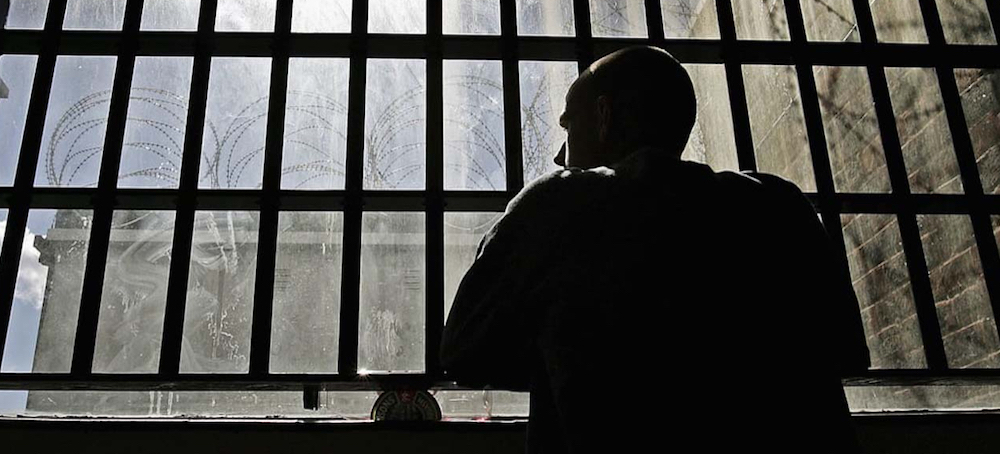 A prisoner. (photo: Peter Macdiarmid/Guardian UK)
A prisoner. (photo: Peter Macdiarmid/Guardian UK)
Study: Extreme Heat Is Driving Deaths in US Prisons
Alleen Brown, Grist
Brown writes: "Extreme heat is killing people in prisons across the United States, according to a new study published in the academic journal PLOS ONE."
New research makes clear the link between climate change and prison mortality.
Extreme heat is killing people in prisons across the United States, according to a new study published in the academic journal PLOS ONE. The research provides some of the first epidemiological evidence of the link between the climate crisis and prison mortality in the nation with the highest incarceration rate in the world.
The study examined deaths in both state-run and privately run prisons during the hot summer months of June, July and August between 2001 and 2019. Researchers found that a 10-degree temperature increase above the average correlated with a 5.2 percent increase in deaths — or a 6.7 percent increase among prisoners with heart disease.
To Julie Skarha, the study’s lead author, who recently finished her doctorate in epidemiology at Brown University, “The biggest surprise was that the highest increase of mortality was in the Northeast,” she told Grist. The study found that a two-day heat wave meant a mortality increase of 21 percent in the Northeast, compared to 0.8 percent in the Midwest, 1.3 percent in the South, and 8.6 percent in the West.
Also startling was the link between heat and suicide in prisons nationally. In the three days following an extreme heat day, the researchers noted a 22.8 percent increase in suicides.
To the researchers as well as advocates for people who are incarcerated, the findings hint at deepened desperation among prisoners in the summer, even in states not known for their heat. To Skarha and others, the data is a call to action for policymakers. “There should be more regulation around what kind of temperatures people are exposed to in these settings,” Skarha said. “If temperature regulation isn’t happening in these settings, then they shouldn’t be operating.”
Outside of prison, people protect themselves from heat by moving to a cooler area, turning on a fan or air conditioner, taking a cool shower, or drinking water. Such options are not readily available to people in prisons.
Making matters worse, people in prison are uniquely vulnerable to heat-sensitive illness. People age more rapidly while incarcerated and are disproportionately diagnosed with diseases like diabetes. A 2016 survey found that about 43 percent of people incarcerated in state prisons had received a mental health diagnosis. A class of drugs known as psychotropics, used as a treatment for certain mental illnesses, is known to cause heat-sensitivity.
Joseph Jackson, executive director of the Maine Prisoner Advocacy Coalition, said he was surprised to hear that death correlated with heat in Northeastern prisons. Last September, Jackson’s organization helped organize a “Stop Killing Us” rally to protest over a dozen jail and prison deaths so far that year in Maine. “We didn’t attribute them to heat,” he told Grist. However, he added, they seemed to occur disproportionately during summer.
Heat’s impact depends on how acclimated people are to the weather, helping explain the heightened Northeastern death toll. It’s also a result of the fact that the study didn’t take into account whether a facility had air conditioning. While no publicly available national data set exists that describes which prisons lack air conditioning, Northeastern prisons are likely less prepared for heat than those in the South, according to Skarha.
Jackson, who was incarcerated for 20 years, recalled that, early in his sentence, he was placed in an old concrete and steel building with poor ventilation. “During summer, when the walls heated up, it was miserable,” he said.
An earlier study by Skarha found that air conditioning means the difference between life and death for some prisoners in Texas. In facilities lacking air conditioning, her team estimated that more than 250 Texans died over the past two decades due to heat. Reporters at USA Today found that 44 states lack universal prison air conditioning.
The population at risk is vast and disproportionately Indigenous, Black and Latino. Over 10 million people move in and out of the U.S. prison system every year, the study underlines. Meanwhile, scientists expect heatwaves to come more frequently as the climate crisis deepens, further imperiling the lives of prisoners.
Skarha said the study underestimates the impact of heat on prisons. For example, the majority of people incarcerated at the jails of New York City’s Rikers Island, which were not a part of the study, also lack air conditioning, said Julia Solomons, senior policy social worker at Bronx Defenders, a public defender nonprofit. City officials say the infrastructure is unfit to install it, but plans to close the notorious jails are moving at a snail’s pace.
“People tell us that they are suffering without access to breathable air,” she said. “Every summer we know this is coming and nothing changes.”
READ MORE
Contribute to RSN
Follow us on facebook and twitter!
Update My Monthly Donation
PO Box 2043 / Citrus Heights, CA 95611










